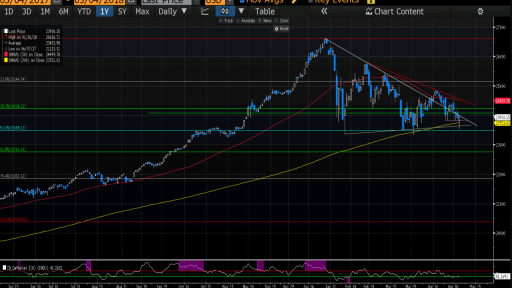- Home
- >
- Stocks Daily Forecasts
- >
- Why the stock market is unimpressed by the best first-quarter results in 24 years

Why the stock market is unimpressed by the best first-quarter results in 24 years

By at least one measure, corporate earnings are the best in nearly a quarter-century. However, the stock market is not enthused!
Rather than rally on the back of upbeat results, the main equity benchmarks have sulked lower.
According to Thomson Reuters I/B/E/S, of the 343 companies, or about 70%, of S&P 500 members that have reported earnings to date, 79.9% have reported earnings per share that were above analysts’ expectations, putting the season on track for the highest earnings beat rate on record, going back to 1994.
So far, the first-quarter growth rate for EPS is 22%, compared with consensus earnings growth of 16.3% as of April 12. Although it is isn’t easy to pinpoint exactly what’s troubling investors, here are a few theories as to why this dynamic may be playing out:
Volatility
“What concerns me the most is that we’ve had spectacular earnings and the market is just shrugging it off,” said Randy Frederick, managing director of trading and derivatives at Schwab Center for Financial Research.
The Cboe Volatility Index VIX, +0.13% or VIX, surged to an eye-popping intraday level of 50.30 on Feb. 6, abruptly ending a period of quiet that reigned in 2017 and ushering in a new era of sometimes vicious market swings. The VIX, which is calculated using options on the S&P, is a measure of expected, or implied, volatility over the following 30 days.
Frederick believes the new regime of volatility, which resulted in the first correction for the Dow and S&P 500 in about two years, has pushed investors to the sidelines, which has resulted in prices hovering lower due to a lack of buyers.
A strengthening dollar and rising yields
According to Morgan Stanley’s Chris Metli, a strengthening dollar—the greenback put in its best monthly rise since President Donald Trump’s election in April—and a rising 10-year Treasury note yield —the 10-year yield touched its highest level in more than four years above 3% late last month—are also factors weighing on stocks. That 3% round-number level has caused angst on Wall Street, because it translates to higher corporate borrowing costs.
A weaker dollar tends to be beneficial for multinational companies, because it can support sales of goods and services abroad, with a stronger dollar having the opposite effect.
Lack of leadership
MarketWatch’s Ryan Vlastelica wrote that estimates for the percentage of S&P 500 sectors outperforming for two months in a row recently hit multiyear lows, and traded near multidecade lows, citing research from Michael Wilson, chief U.S. equity strategist for Morgan Stanley.
“Our experience tells us that these leaderless periods typically occur during important transitions in the market,” he wrote. The next stage, if history is any indication, could favor what he called “late-cycle sectors,” including energy, industrial, and health-care stocks.
The outlook
There are signs that harmonized global growth is starting to unwind and that has hurt investor confidence. “The problem is that there have been macro forces that have been clouding the outlook, so it’s preventing the investor from taking the good earnings news and running with it,” Alec Young managing director of global markets research at FTSE Russell told MarketWatch last week.
Concerns about global trade tensions between China and the U.S. and the fear that the stellar earnings could be as good as it gets for stocks are all combining to undermine the sort of confidence that was in abundance during last year’s run of repeated records for equity benchmarks, as the U.S. economy enters it ninth year of expansion and as the Federal Reserve moves to normalize monetary policy from crisis-era levels.
 Trader Aleksandar Kumanov
Trader Aleksandar Kumanov Read more:
If you think, we can improve that section,
please comment. Your oppinion is imortant for us.











